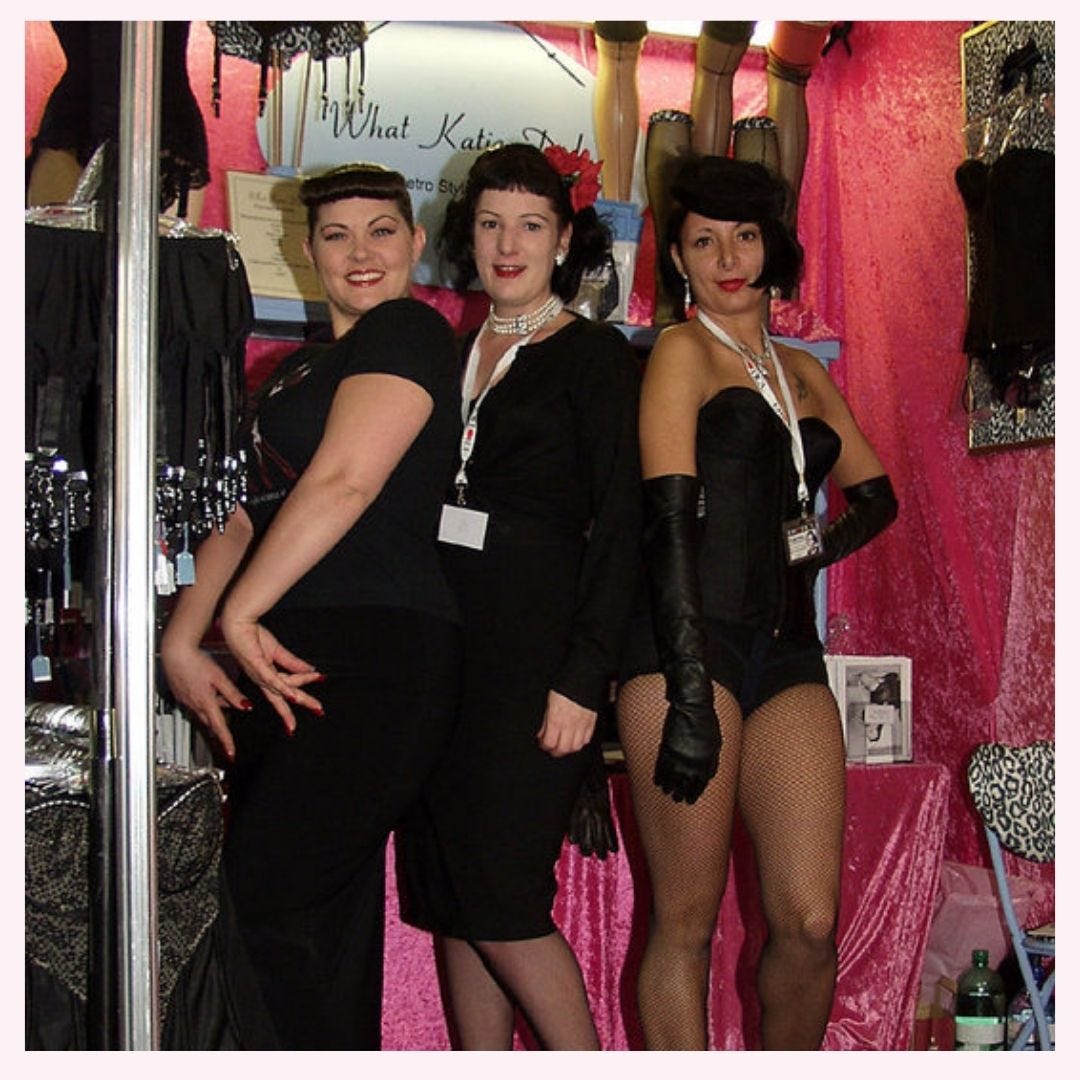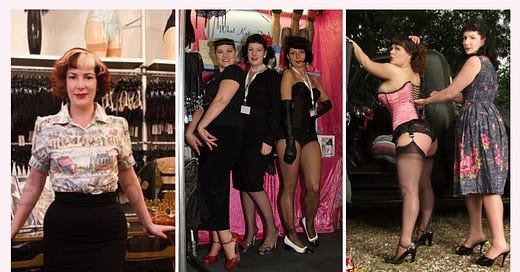Why We’re Happy to Be a Micro Business
Reflections on 25 years of staying small and why that’s just fine by me.
I’ve been thinking a lot about business lately. Maybe it’s the news about what’s been happening to some slightly larger UK brands over the last few years, or maybe it was watching the BBC’s recent two-part series The Rise and Fall of Michelle Mone, who launched lingerie brand Ultimo in 1999—the same year I started What Katie Did.
It got me thinking about how much things have changed since then, and why I’m still grateful every day that we’ve stayed deliberately small.
To clarify the business definitions here in the UK:
Micro business: up to £2 million turnover and up to 10 employees (That’s us!)
Small business: up to £10 million turnover and up to 50 employees (e.g. Playful Promises)
Medium business: up to £50 million turnover and up to 250 employees (e.g. Snag Tights/Snag Group)
When I started What Katie Did, my goal was simple: support myself. I figured that if I kept below the VAT threshold and worked from home, I could just about make a living. It helped that I’d never had a well-paying job—so my expectations were, let’s say, realistic.
I had friends with exciting, lucrative jobs who couldn’t give them up to go full-time on their own businesses. In contrast, I had nothing to lose. My dad—who also ran his own micro business—gave me some crucial advice at the time:
“This is probably the only time in your life you’ll be able to do this. You have no mortgage, no husband or children, and nobody—apart from a cat—depending on you.”
Sage advice from my boss at the time also helped. Joe, who ran Honour with his wife Mandy, told me to choose an ambiguous name. Don’t put "stockings" or anything too specific in it, he said. That way, the brand could evolve. What Katie Did was born.

I started with £100 worth of stockings and set up a stall at the London Fetish Market. That first year I worked full-time at Honour while trading at three Sunday markets each month—Kings Cross, Camden, and Birmingham. I also took out a terrifying £700 loan to buy a computer and invested £100 in a fax machine. Everything else I earned went straight back into stock.
By year two, I was brave (or foolish?) enough to quit my day job and open a tiny shop in Camden Market, paying £100 a week in rent. The brave bit lasted a week before I started temping as a secretary again. For a year, I worked full-time at British Transport Police, printed orders at home in the morning, packed them after work in the Camden shop, and dashed to the post office to catch the last post. Weekends? Back in the shop.
Fast forward to 2004: I had a newborn baby, a house in Reading, and a fiancé with a steady—if soul-sapping—sales job. That job gave us the financial security we needed. By 2005, he joined the business, and we had a loyal customer base, a trusted factory (still with us today), and a business that had never borrowed a penny.
And that’s a big part of why we’re still here.
The High Cost of Growth
A lot of our survival has come down to luck, timing, and thrift. My early London rent was an illegal sublet (cheap!), and my partner already had a mortgage (no deposit needed). Starting today, with today’s costs, What Katie Did would likely never have got off the ground.
We’ve never borrowed money. Not for stock. Not for expansion. Not even when things got tight.
That’s put us in a very rare position. Yes, we’ve made compromises—like not being able to offer a full size-inclusive range. I remember once explaining on Facebook that I wasn’t willing to risk our home to expand the size range unless we could be certain those items would sell. Some people didn’t understand the connection—but the truth is, a loan that size would have been secured against our house. That’s a huge gamble to take on the hope of good will translating into actual sales.
I’ve seen what borrowing can do to businesses. In 2008, during the financial crash, our neighbur was a lovely printing company that had taken out loans. As soon as the crash hit, the banks called them in, and the business collapsed. Just like that.
We’ve also watched the rollercoaster of private equity from the sidelines. Agent Provocateur sold to 3i for £60 million in 2007. That kind of money is mind-blowing. But as often happens, costs were cut, and the luxury lingerie that made AP so iconic disappeared. A friend of the founders once told me they were happiest when they just had their little Soho shop. I’ve never forgotten that.
In recent years, I’ll admit to moments of FOMO. Playful Promises soared with private equity investment in the hundreds of thousands. But when they missed just one payment, the rug was pulled. Thankfully, they found a buyer and their staff remained employed—but it was a close call.
Snag Group is another example. They’ve grown at lightning speed, with a turnover of nearly £34 million in 2024. But a look at their public accounts shows finance running into the millions. That’s a level of risk I’ve never been comfortable with.
Slow, Steady, and Still Standing
In a recent meeting, our accountant asked what the plan was. I told him: no major moves. Just a continued focus on making beautiful things. He looked visibly relieved. Staying in business for over 25 years—paying our staff, our bills, and still loving what we do—is a success story in itself.
We’re not planning global domination. But there is still so much I want to do—just in our own time and on our own terms. The focus now is on quality, sustainability, and beauty over chasing big numbers. I know how lucky I am to have the choice.
And if you’re ever tempted by the idea of private equity, I can’t recommend In My Shoes by Tamara Mellon enough. She took Jimmy Choo mainstream—and lived to tell the financial tale. It’s required reading for anyone flirting with the idea of outside investment.
For us? We’re happy staying micro. Small is beautiful. And still here.
Links:
The Rise and Fall of Michelle Mone (BBC) I reference this as Michelle was touted as one of the most successful Scottish businesswomen ever but at Ultimo’s height their turnover was just £10 million - far less than the Snag Group which was founded by another Scottish woman.
Agent Provocateur Sale to 3i, 2007.
In My Shoes by Tamara Mellon (Amazon). Interview with Tamara discussing private Equity.
Companies House (UK).
Katie Thomas is the founder of What Katie Did, a vintage-inspired lingerie and fashion brand that brings mid-century glamour to modern wardrobes. When not designing new collections, she can be found hunting for vintage treasures across Somerset and beyond.
Curious to explore more vintage-inspired treasures? Our lovingly crafted lingerie and fashion collections at What Katie Did bring the elegance of yesteryear into your modern wardrobe, from perfectly structured corsets to the most delicate of intimates. Each piece tells its own story of timeless glamour.




Good for you Katie! What a wonderful achievement, and the best thing is that you are so happy with everything. You haven’t been ‘led astray’ by greed like most people seem to be, and you are living life on your own terms.
Fascinating insight. A really interesting read.
(And yes I wish there was a bigger size range but now I do understand why there isn't)